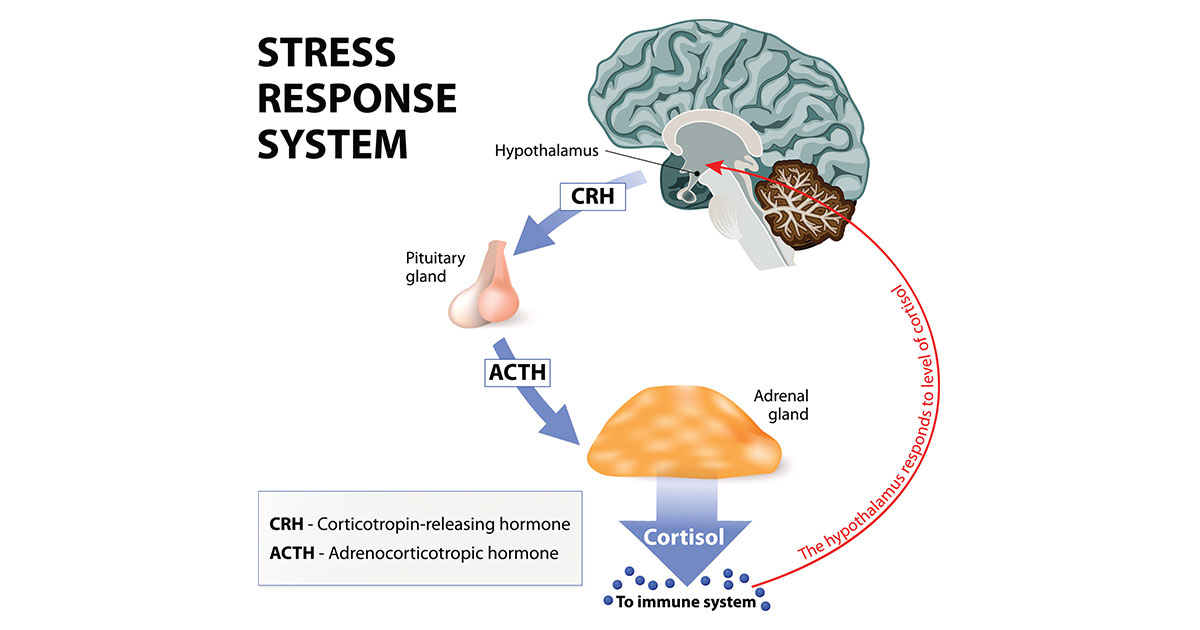Symptoms of Continual Stress
Over time, the body begins to exhibit signs that it is under recurring stress, which may present as an acute stress disorder. While a single stressful situation causes the stress response to kick into a high drive to protect the body from immediate danger, prolonged stress can lead to more prolonged changes.3
Some of these conditions include:
 Changes in appetite
Changes in appetite- Body pains and aches
- Irritability
- Anxiety
- Dizziness
- Headaches
- Changes in bowel function
- Difficulty sleeping
- Lowered energy
- Mood changes
Each of these things can heavily affect daily life. Issues like difficulty sleeping, decreased appetite, and bowel function changes can greatly affect how you go about your day. For example, less sleep means you’re constantly tired and don’t have the time to recover your energy. This means your body doesn’t have the chance to replenish itself and is constantly working overtime. When machines are run constantly without any upkeep or downtime, they break down quickly, and your body is like a machine in this way. After too much time in constant stress, the body begins to break down, sending a desperate signal that something is wrong.
Long-Term Impact of Stress on Health
While immediate symptoms of ongoing stress are certainly disruptive, continual stress affects your health in the long term. The long-term effects of stress can be incredibly harmful and, over time, will become more intense. Things like changes in diet, bowel function issues, and mental health concerns will become more serious as they progress. For example, severe and damaging obesity — or the reverse, serious malnutrition, may result — and bowel troubles may become more serious, increasing the risk for irritable bowel syndrome (IBS). Finally, short-term mental health issues, such as situational anxiety or bouts with depression, may become continuous and chronic.
 Women may experience changes to their menstrual cycles, worsening cramps, and general distress. Over time, stress can affect the inflammatory response in both women and men, triggering an increase in inflammation in the body. This can lead to issues with diabetes, multiple sclerosis, cardiovascular response, and even dangerous reactions to routine vaccinations. Those with autoimmune diseases, like Hashimoto’s disease or lupus, can experience more intense side effects, and the symptoms of their autoimmune illness can be triggered by short-term stress and intensified with long-term stress.4
Women may experience changes to their menstrual cycles, worsening cramps, and general distress. Over time, stress can affect the inflammatory response in both women and men, triggering an increase in inflammation in the body. This can lead to issues with diabetes, multiple sclerosis, cardiovascular response, and even dangerous reactions to routine vaccinations. Those with autoimmune diseases, like Hashimoto’s disease or lupus, can experience more intense side effects, and the symptoms of their autoimmune illness can be triggered by short-term stress and intensified with long-term stress.4
Even cancer can be linked to stress. Currently, research attributes only 10% of cancers to a genetic origin. That means that a vast amount of other factors, including lifestyle, environment, and stress, can lead to the rest. Studies have shown that chronic exposure to stress hormones, reduced immune response, and increased inflammation may not only promote the continued development of cancer but also the genesis of tumors in the first place.5
How Stress Affects Your Life
So far, we’ve been speaking in biological terms about the physical and mental effects of stress. But it’s also important to take a broader look at stress and how it affects different groups of people. For example, students can face many setbacks due to stress. Aside from the physical health issues that can become a barrier to learning for many students, the emotional effects of stress can take a major toll on homework, attendance, and test performance.
Because stress can affect memory and cognitive function, overall class performance may be poor, and students can have a difficult time taking notes, completing assignments, and performing well on tests. This can lead to major setbacks in their education.
Working professionals are also greatly affected by stress. Physical symptoms of stress may cause a person to miss work or otherwise fail to meet important deadlines. Missing too many days can result in disciplinary actions and may even result in termination. If a person isn’t missing work due to stress, they may be performing poorly because of the stress they are facing. This could also result in lost work or even termination.
Caregivers also face a great deal of stress, both from providing care for a loved one as well as from outside stressors. This can result in poor performance, forgetting important tasks that are necessary for the person they’re providing care for, and may even mean that they’re not offering the best care possible for their loved one. This can be an especially problematic situation because they’re responsible for the well-being of someone else.
Finally, even retired people and the elderly can face stressors that negatively affect their well-being. Financial issues, changes in healthcare, or new, difficult-to-understand situations can add an additional level of stress that people may be unprepared to manage. This can negatively impact already fragile health situations or limit the cognitive output of those who may already have issues with memory or processing new information.
Relieving Stress
Of course, there are many ways you can choose to relieve stress, but it’s important to remember that lifestyle choices regarding stress management can also affect your health. Unfortunately, many people attempt to reduce stress with alcohol, recreational drugs, and pharmaceutical medications that nearly always cause negative effects of their own. If what you view as a stress-relieving habit causes additional physical and mental health issues, it isn’t actually serving to reduce your stress at all.
 Developing real techniques for stress management outside of the quick fix substances can provide is essential for reducing long-term stress. Start first by considering your physical health. Making sure to exercise regularly, whether you choose intense workouts or even regular walks in nature, can help relieve stress by giving the body something physical to exert its energy upon. Regular exercise can also help with your sleep schedule and help you get more regular and restful sleep. Getting enough sleep helps your brain manage stress levels and improves cognitive function.6
Developing real techniques for stress management outside of the quick fix substances can provide is essential for reducing long-term stress. Start first by considering your physical health. Making sure to exercise regularly, whether you choose intense workouts or even regular walks in nature, can help relieve stress by giving the body something physical to exert its energy upon. Regular exercise can also help with your sleep schedule and help you get more regular and restful sleep. Getting enough sleep helps your brain manage stress levels and improves cognitive function.6
Mental health is important to your overall health as well, so next, you should consider the best ways that you can perform self-care. This can be via meditation and mindfulness practices, relaxing baths, reading a book, or even working on a hobby. Those with more serious mental health concerns should consider therapy. Having the right therapist to communicate with to alleviate worries and stress can help boost your mental health. You can also learn valuable coping skills to help you address stressful situations in the moment.
Avoiding Long-Term Stress
Avoiding stress can be difficult to do, particularly if stress is a part of your normal daily routine. Even if you have a stressful job or you have personal concerns that are affecting your stress levels, there are some things that you can do to be proactive. First, identify what is causing you stress. Then, you can consider if there’s a way to manage the way these things impact you.
 Relationships can also contribute to stress, but they can also help alleviate stress. For example, building strong, healthy relationships can mean someone else is there to provide a listening ear or stress management techniques. Meanwhile, negative or toxic relationships can raise your stress levels. If you have a relationship that is causing you undue stress, you may need to take a step back or consider counseling to alleviate the issue.
Relationships can also contribute to stress, but they can also help alleviate stress. For example, building strong, healthy relationships can mean someone else is there to provide a listening ear or stress management techniques. Meanwhile, negative or toxic relationships can raise your stress levels. If you have a relationship that is causing you undue stress, you may need to take a step back or consider counseling to alleviate the issue.
When you feel stress getting to you, it’s important to develop the ability to stay in the moment, assess the situation, and walk away if needed. This can be hard to do, depending on what’s causing the stress reaction. Rather than getting upset, however, removing yourself from the situation can help you manage your stress. Going for a walk or practicing deep breathing can help ground you and give you something else to focus on.
Managing Stress
Managing stress is absolutely crucial to your overall health. Stress puts additional burdens on all of your body functions. From immune system function to cognitive function and mental health, stress can be incredibly damaging in both the short and long term. Recognizing the symptoms of stress can help you understand when it’s impacting you.
One of the most critical effects of high levels of stress occurs on your mental health. Poor mental health is incredibly damaging to your overall health and can lead to making poor choices, including those that cause an additional negative impact on your mind and body. That’s why knowing when to get help is so important.
ATMC for Solutions for Long-Term Stress and Anxiety
If you’re feeling the negative impacts of stress over the long term, it may be time to seek care that focuses on the physical, emotional, and chemical causes — and effects — of stress. At Alternative to Meds Center, we take a holistic approach to mental health care and stress management, and we strive to help people address stress and mental health issues without the damaging impact of pharmaceutical medications.
We offer premium mental health services so you can return to living life and lead a happier and healthier existence. If you believe it might be time to address the way persistent stress and mental health symptoms have been affecting you, Alternative to Meds is here for you. Contact us today to learn more about our holistic mental health and dual diagnosis programs.

 For example, studies on stress through the lifespan 2 reveal that prenatal stress has been linked to many long-lasting effects later in life, such as increased sensitivity to stress, a greater sensitivity to substance use disorders, and a greater likelihood of mood-related mental health issues. Eventually, this increased sensitivity to stress can affect memory and cognitive function. In adolescents and adults, consistently high levels of stress can create conditions ripe for depressive disorders.
For example, studies on stress through the lifespan 2 reveal that prenatal stress has been linked to many long-lasting effects later in life, such as increased sensitivity to stress, a greater sensitivity to substance use disorders, and a greater likelihood of mood-related mental health issues. Eventually, this increased sensitivity to stress can affect memory and cognitive function. In adolescents and adults, consistently high levels of stress can create conditions ripe for depressive disorders. Changes in appetite
Changes in appetite Women may experience changes to their menstrual cycles, worsening cramps, and general distress. Over time, stress can affect the inflammatory response in both women and men, triggering an increase in inflammation in the body. This can lead to issues with diabetes, multiple sclerosis, cardiovascular response, and even dangerous reactions to routine vaccinations. Those with autoimmune diseases, like Hashimoto’s disease or lupus, can experience more intense side effects, and the symptoms of their autoimmune illness can be triggered by short-term stress and intensified with long-term stress.4
Women may experience changes to their menstrual cycles, worsening cramps, and general distress. Over time, stress can affect the inflammatory response in both women and men, triggering an increase in inflammation in the body. This can lead to issues with diabetes, multiple sclerosis, cardiovascular response, and even dangerous reactions to routine vaccinations. Those with autoimmune diseases, like Hashimoto’s disease or lupus, can experience more intense side effects, and the symptoms of their autoimmune illness can be triggered by short-term stress and intensified with long-term stress.4 Developing real techniques for stress management outside of the quick fix substances can provide is essential for reducing long-term stress. Start first by considering your physical health. Making sure to exercise regularly, whether you choose intense workouts or even regular walks in nature, can help relieve stress by giving the body something physical to exert its energy upon. Regular exercise can also help with your sleep schedule and help you get more regular and restful sleep. Getting enough sleep helps your brain manage stress levels and improves cognitive function.6
Developing real techniques for stress management outside of the quick fix substances can provide is essential for reducing long-term stress. Start first by considering your physical health. Making sure to exercise regularly, whether you choose intense workouts or even regular walks in nature, can help relieve stress by giving the body something physical to exert its energy upon. Regular exercise can also help with your sleep schedule and help you get more regular and restful sleep. Getting enough sleep helps your brain manage stress levels and improves cognitive function.6 Relationships can also contribute to stress, but they can also help alleviate stress. For example, building strong, healthy relationships can mean someone else is there to provide a listening ear or stress management techniques. Meanwhile, negative or toxic relationships can raise your stress levels. If you have a relationship that is causing you undue stress, you may need to take a step back or consider counseling to alleviate the issue.
Relationships can also contribute to stress, but they can also help alleviate stress. For example, building strong, healthy relationships can mean someone else is there to provide a listening ear or stress management techniques. Meanwhile, negative or toxic relationships can raise your stress levels. If you have a relationship that is causing you undue stress, you may need to take a step back or consider counseling to alleviate the issue.







